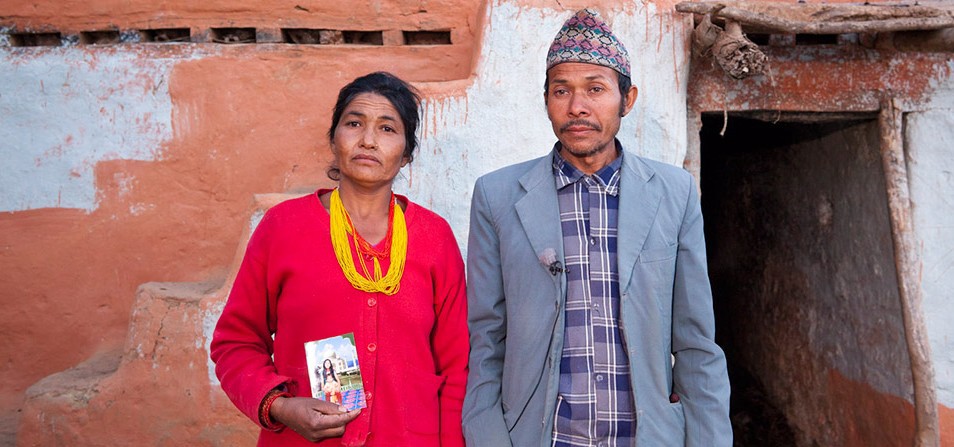Amy Benson is the co-owner of Nonfiction Media, a production company in Seattle. She has shot and edited over 25 short films, telling the stories of nonprofits in the Pacific Northwest, Africa and Asia. Her personal documentary short — “Three: Impressions from the Struggle for Girls’ Education” — was the centerpiece of the UNIFEM Singapore Film Festival. Another short, “Called to Shine,” about the only female preacher in Clarksdale, Mississippi, premiered at the Langston Hughes Film Festival. Her very first short, about life in a local homeless encampment, won awards from Seattle International Film Festival and The Seattle Times. “Drawing the Tiger” is her first feature film.
“Drawing the Tiger” will premiere at the 2015 Hot Docs Film Festival in Toronto on April 29.
W&H: Please give us your description of the film playing.
AB: “Drawing the Tiger” is a seven-year portrait of a Nepali family surviving the devastating loss of their bright daughter, Shanta, after she gets a scholarship and leaves their village to go to school in the city and meets tragedy. It intimately illuminates the complexities of Western development through observing the experience of one regular family in extraordinary circumstances.
W&H: What drew you to this story?
AB: This project began as a promotional video in 2008 when my husband, Scott Squire, and I were hired to tell the story of an American-run NGO that provides scholarships for girls to go to school in Kathmandu.
This is how we met Shanta. She was chosen by the organization for the promotional piece because she so clearly exemplified the power of girls’ education. She was determined to graduate and return as a doctor to her village, where she would teach all the women about birth control. I fell in love with Shanta. She told me she wanted “to be somebody” — and I had no doubt that she would.
Then, a year later, we got news from the NGO that Shanta had died by suicide. I was shattered. Then two things happened: I learned that currently the number one cause of death for girls and women in Nepal is suicide. Then the NGO asked me to remove Shanta from their publicity materials. Each time Shanta appeared on my edit monitor, I clicked SHIFT and then DELETE. That is when I knew we had to continue to tell her story, even though at that time I had no idea what that would actually entail.
W&H: What was the biggest challenge in making the film?
AB: My biggest struggle was understanding and justifying why it was okay for me to be telling Shanta’s story. I was acutely aware of my privilege and power as we entered Shanta’s village — Westerners with camera equipment worth more in dollars than all the assets in the village combined, literally.
But Shanta’s family, the Darnals, barely questioned why we had come. They just opened up right away. They were ready. It was almost as if they had been waiting for us. They wanted to talk about Shanta and about everything in their life.
This is what I believe: 99% of people want their stories told. It is our job as documentary filmmakers — like the African griots — to listen, distill and make sense of the stories we collect.
If we are doing our job right, we are doing it with mad integrity for our subjects — and in turn for the stories themselves. To us, mad integrity means we constantly question our assumptions. We constantly ask ourselves, Are we telling the most accurate, most truthful story we can? This was what fueled each decision in the making of “Drawing the Tiger.”
W&H: What do you want people to think about when they are leaving the theatre?
AB: As human beings, we are all deeply connected. We all strive to find love, purpose and security — and this truth needs to be factored into how Western development is approached. More than tuition, books and school uniforms is needed to empower girls like Shanta. She needed social and emotional support as well. We want to leave folks talking about what that might look like going forward.
W&H: What advice do you have for other female directors?
AB: You actually do know what you are doing, just as much as anyone else — because everyone is making it up as they go along. I think even those bigwigs are [improvising on the spot].
W&H: What’s the biggest misconception about you and your work?
AB: The biggest misconception about “Drawing the Tiger” is that it is a film about girls’ education. It is really a deep portrait of one Nepali family; how they contend with the pressures and promise and trauma and loss of education merely frames it.
W&H: How did you get your film funded? Share some insights into how you got the film made.
AB: I apply for everything! I am a serial submitter. Over the seven years of making this film, we have applied for over 30 grants and pitch forums — some several times. We were lucky enough to get some grants at the beginning of the project. Our first was from the Pacific Pioneer Fund. It launched us. And then we received a production grant from The Sundance Institute. We also had two successful Kickstarter campaigns, five fundraising house parties and a lot of networking — plain old asking folks for money. I just spoke to a university film studies class where I described myself as a fundraiser/filmmaker.
W&H: Name your favorite woman-directed film and why.
I love Lauren Greenfield, as a still photographer and as a filmmaker. She just gets in there. Her work is both raw and loving. After watching “Thin,” I cried — a big, heaving-on-the-floor kind of cry — both for Lauren’s subjects and for her accomplishment.







